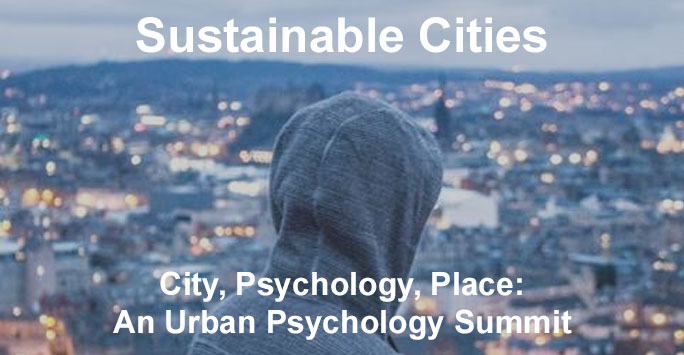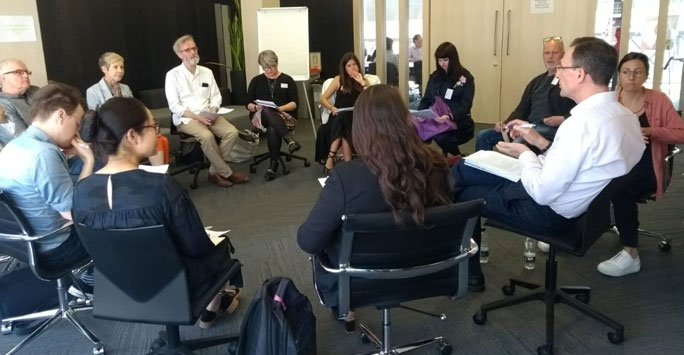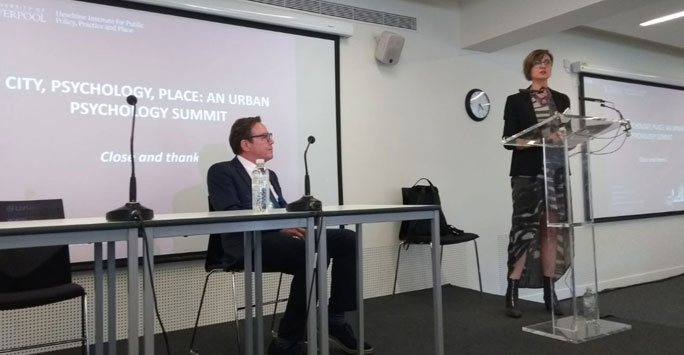City, Psychology, Place: An Urban Psychology Summit
Posted on: 19 August 2019 by Mark Boyle in 2018 Posts

The Humanities & Social Sciences Research Theme of Sustainable Cities is led by the Heseltine Institute of Public Policy, Practice and Place. In June 2019 they hosted the 'City, Psychology, Place' urban psychology summit examining the interaction of urban life and mental health.
Major speakers from across the world converged on the University of Liverpool in London Campus on June 27th 2019 for Europe’s first conference considering the interaction between urban life and mental health.
City, Psychology, Place: An Urban Psychology Summit was organised by Professor Mark Boyle and Sue Jarvis Director and Deputy Director respectively of the University of Liverpool’s Heseltine Institute of Public Policy, Practice and Place, in partnership with Chris Murray CEO of Core Cities and Charles Landry (Founder of Comedia)
The summit was called in response to significant evidence – such as rapidly rising prescription rates – that suggests mental health is worsening, particularly in some population groups and particularly in cities; and that this has an economic as well as social effect.
The event was chaired by the CEO of the UK Council for Psychotherapy (UKCP), Professor Sarah Niblock.

Professor Mark Boyle (Director of Heseltine Institute) and Chris Murray (CEO Core Cities) lead a workshop on planning and therapeutic spaces.
Professor Niblock said: “Most efforts to improve mental health are targeted at treating people who already have mental health problems. Psychotherapists, designers and planners could be working together on protective factors such as access to green spaces, social interaction across all ages and backgrounds, even sleep and safety into the city. Psychotherapeutically-informed design would help strengthen the population’s mental health resilience for prevention and recovery.”
The keynote address was delivered by Mindy Thompson Fullilove, Professor of Urban Policy & Health at The New School, New York.
Professor Fullilove – a psychiatrist - is among the world’s leading experts on the ties between environment and mental health. Her most recent book, Root Shock: How Tearing Up City Neighborhoods Hurts America and What We Can Do About It urges the reader to see the city as “a fluid, constantly taking new shapes” and warns against urban renewal projects that disregard subtle divisions in race and class.
The programme – included contributions from co-organiser, Charles Landry, fellow at the Robert Bosch Academy in Berlin and international authority on the use of imagination and creativity in urban change; Helena Marujo of the World Happiness Summit and Lisbon University; Cambridge University Professor of Economic Geography, Ron Martin; CEO of Greater Manchester Health and Social Care Partnership, Jon Rouse CBE and Liverpool’s wellbeing expert, Professor Rhiannon Corcoran among others. The closing keynote was delivered by Dr Tim Kendall, the National Clinical Director for Mental Health at NHS England.

Dr Sarah Niblock CEO of the UK Council for Psychotherapy (UKCP) Introduces key note speaker Dr Tim Kendall, National Clinical Director for Mental Health at NHS England
Professor Boyle said: “Forty years of neoliberal reform and a decade of austerity have inflicted new injuries of class, manifest particularly clearly in the tsunami of mental health issues witnessed in urban Britain and elsewhere. Our biographies are embroiled in the vicissitudes of a restless global capitalism and it is not surprising that economic precarity is being felt deeply as the defining existential challenge of today.”
Chris Murray, co-author of Psychology & the City: The Hidden Dimension, said: “Cities are the solution, not the problem, and it is clear that more and more people want to live in them. We are a very adaptable species, but there is evidence that we struggle to cope with some of the demands of city living, which in evolutionary terms is a new experience. It is astonishing then that psychology, the single discipline most concerned with our mental and emotional functioning, is not more recognised as a tool in planning, making and managing cities.
Sustainable Cities is just one of the Faculty of Humanities & Social Sciences' Research Themes. Find out more about them all here.
Keywords: Sustainable Cities Research Theme.